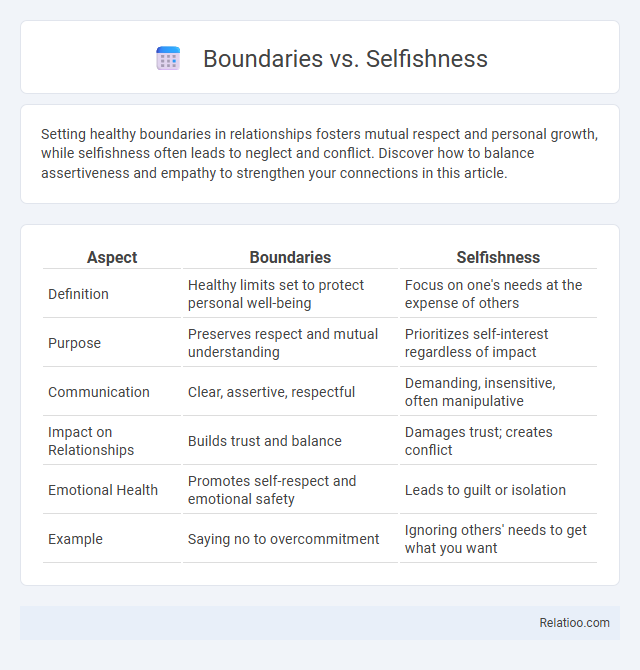Setting healthy boundaries in relationships fosters mutual respect and personal growth, while selfishness often leads to neglect and conflict. Discover how to balance assertiveness and empathy to strengthen your connections in this article.
Table of Comparison
| Aspect | Boundaries | Selfishness |
|---|---|---|
| Definition | Healthy limits set to protect personal well-being | Focus on one's needs at the expense of others |
| Purpose | Preserves respect and mutual understanding | Prioritizes self-interest regardless of impact |
| Communication | Clear, assertive, respectful | Demanding, insensitive, often manipulative |
| Impact on Relationships | Builds trust and balance | Damages trust; creates conflict |
| Emotional Health | Promotes self-respect and emotional safety | Leads to guilt or isolation |
| Example | Saying no to overcommitment | Ignoring others' needs to get what you want |
Understanding Boundaries: Core Definitions
Boundaries are essential limits that protect your emotional and physical well-being, distinct from selfishness, which disregards others' needs. Understanding boundaries involves recognizing where your comfort and values lie, enabling you to communicate your needs clearly without guilt. Practicing self-care respects these boundaries, fostering healthy relationships and personal growth.
What Does Selfishness Really Mean?
Selfishness often carries a negative connotation, implying an excessive focus on one's own needs at the expense of others, while setting boundaries and practicing self-care prioritize your well-being without harming relationships. Boundaries create clear limits to protect your mental and emotional health, whereas self-care involves intentional acts to nurture and replenish yourself. Understanding the distinction helps You maintain healthy relationships while ensuring your needs are respected, preventing self-neglect or harmful selfishness.
Key Differences Between Boundaries and Selfishness
Boundaries clearly define your personal limits to protect your mental and emotional well-being without disregarding others' needs, while selfishness involves prioritizing your own desires at the expense of others. Establishing healthy boundaries requires respectful communication and mutual understanding, ensuring that your needs are met without guilt or harm to relationships. You can practice self-care by setting boundaries that promote balance, rather than crossing the line into selfish behavior that isolates or alienates those around you.
Healthy Boundary Setting: Why It Matters
Healthy boundary setting is essential for preserving mental and emotional well-being by clearly defining personal limits without crossing into selfishness, which disregards others' needs. Establishing boundaries promotes respect, reduces stress, and enhances relationships by fostering mutual understanding and trust. Effective self-care relies on these boundaries to protect time, energy, and values, ensuring sustainable balance and fulfillment.
Signs Your Boundaries Are Being Overstepped
Signs your boundaries are being overstepped include feeling drained, anxious, or resentful after interactions, sensing that your needs and opinions are dismissed, and experiencing guilt or pressure when asserting limits. These indicators differ from selfish behavior, which prioritizes personal gain at others' expense, and from self-care, which involves deliberately protecting your well-being through healthy boundary-setting. Recognizing boundary violations empowers you to maintain respectful relationships and safeguard your mental and emotional health.
When Do Boundaries Become Selfishness?
Boundaries become selfishness when they rigidly prioritize personal needs at the expense of others' well-being, ignoring empathy and mutual respect. Healthy boundaries protect individual limits while maintaining open communication and consideration for relationships. Distinguishing self-care from selfishness requires balancing personal rights with the emotional impact on others to ensure boundaries foster growth without alienation.
The Role of Communication in Defining Limits
Effective communication plays a crucial role in establishing clear boundaries that distinguish self-care from selfishness. By expressing your needs and limits assertively and respectfully, you ensure mutual understanding and prevent resentment in relationships. Clear dialogue fosters trust, helping others respect your space while maintaining healthy connections.
Misconceptions About Setting Boundaries
Setting boundaries is often misunderstood as selfishness, but it is a vital aspect of self-care that promotes mental health and personal growth. Clear boundaries protect individual well-being by preventing burnout and fostering respectful relationships. Many people mistakenly believe that saying no or prioritizing their needs is rude, when in fact, it is a healthy practice crucial for long-term emotional balance.
How to Balance Self-Care and Compassion
Balancing self-care and compassion requires setting clear personal boundaries that protect your emotional well-being without disregarding others' needs. Effective self-care involves recognizing when to say no and prioritizing rest, while compassion calls for empathy and support in a sustainable way that doesn't lead to burnout. Cultivating this balance enhances resilience, enabling you to care for yourself while maintaining meaningful, healthy relationships.
Cultivating Mutual Respect in Relationships
Establishing boundaries fosters mutual respect by clearly communicating individual needs without encroaching on others' autonomy. Differentiating self-care from selfishness involves prioritizing personal well-being while remaining empathetic to partners' feelings and perspectives. Consistent practice of respectful boundaries strengthens trust and balances personal and relational growth in healthy relationships.

Infographic: Boundaries vs Selfishness
 relatioo.com
relatioo.com